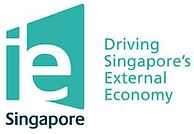International Enterprise Singapore
|
Logo of IE Singapore | |
| Agency overview | |
|---|---|
| Formed | 1983 |
| Preceding Agency | Singapore Trade Development Board (TDB) |
| Jurisdiction | Government of Singapore |
| Headquarters | 230 Victoria Street, Level 10, Bugis Junction Office Tower, Singapore 188024 |
| Agency executives |
Seah Moon Ming, Chairman Teo Eng Cheong, Chief Executive Officer |
| Parent agency | Ministry of Trade and Industry |
| Website |
www |
International Enterprise Singapore (Chinese: 新加坡国际企业发展局), or IE Singapore, is a statutory board under the Ministry of Trade and Industry of the Singapore Government that facilitates the overseas growth of Singapore-based companies and promotes international trade.
Purpose
The main purpose of IE Singapore is to drive Singapore's external economy, by growing Globally Competitive Companies and promoting international trade to ensure Singapore's growth in a globalised world.
With 39 offices in over 20 countries, in addition to being based in Singapore, IE Singapore offers services to help enterprises export, develop business capabilities, find overseas markets and to enter new markets, through its Global Company Partnership and Market Readiness Assistance frameworks. It also attracts global trading companies to establish their home base in Singapore. As a result, Singapore today is a thriving trading hub with world-class trade and financial infrastructure.
There is some overlap with the mandates of other statutory boards under the umbrella of the Ministry of Trade, such as the Economic Development Board, SPRING Singapore and the Agency for Science, Technology and Research (A*STAR). However, it is officially considered to be the "primary" or "lead" agency dealing with such matters.[1]
History
IE Singapore originated from a re-organization of what used to be called the Singapore Trade Development Board (TDB). The TDB was formed in 1983 to develop Singapore as an international trading hub, promoting the nation's goods and services. Activities ranged from basic trade facilitation, to reviewing existing marketing policies, strategies and techniques. It explored opportunities in both traditional and non-traditional markets, and subsequently exported business systems and developed international offshore trading. It also had a role in trade policy after Singapore joined the General Agreement on Tariffs and Trade (GATT), to actively secure market access and lobby for free trade. It issued its own revenue stamps as well.
The re-branding coincided with an acknowledgment that Singapore had to move beyond its investment-led and electronics-dominated export base and to diversify her sources of growth. One of the key thrusts in Singapore's new economic strategy was to help Singapore-based companies internationalize and grow in an increasingly global market. TDB was thus renamed International Enterprise Singapore (IE Singapore) on 12 Apr 2002 to mark a strategic shift in activities, which would now focus less on export promotion, and more on helping Singaporean business start and develop their business overseas.
In this way, IE Singapore is analogous to other trade and export promotion agencies such as the Australian Trade Commission (Austrade) and the Japan External Trade Organization. However, their roles differ to reflect the different economic strategies envisaged by their respective governments, which also depend on the relative profile and orientation of their economies. IE Singapore, for example, focuses also on investment matters, while organizations such as JETRO have also shifted to activities such as import promotion. It is one of many examples of Trade Promotion Agencies (TPOs) internationally facing change, and having adjusted their mission appropriately to suit the times.[2]
References
- ↑ Ministry of Trade Article on IE Singapore
- ↑ TPO's Facing Change. Singapore: New Mission, New Name. Adapted from the presentations of the 4th World Conference of TPOs

.svg.png)